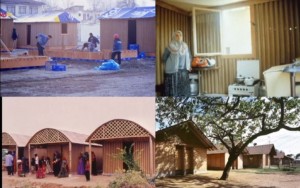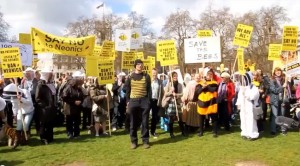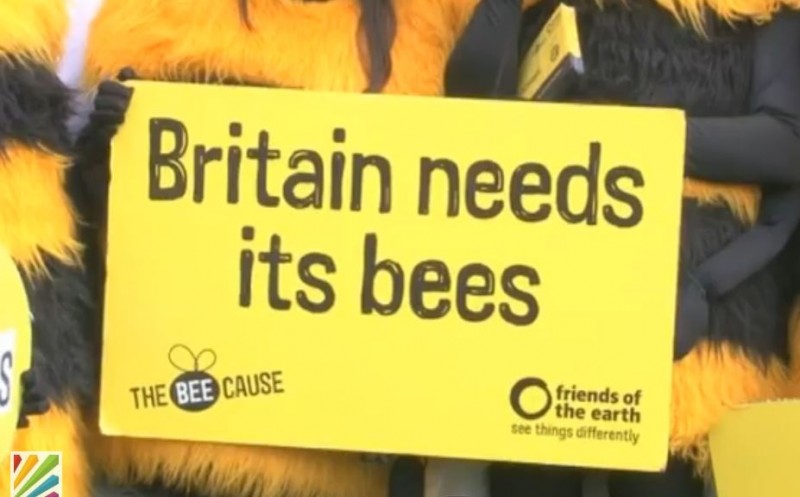“The Web We Want”
“I took an oath to support and defend the constitution and I saw the constitution was violated on a massive scale.”
Global mass surveillance conducted by the US and other governments is “setting fire to the future of the internet”, Edward Snowden told an audience of technology innovators via video link on Monday
“You guys are all the firefighters, and we need you to help us fix this.” It was one of Snowden’s first live appearances since he arrived in Russia seeking political asylum. The Google video connection he spoke through was running through multiple proxy servers to conceal his location.
Snowden criticised the post 9/11 policy of the US which focused on breaking communication security rather than protecting information. He also criticised the NSA’S mass data collection as being ineffective and a waste of resources. The agency should instead be focusing on the type of people who present a threat. He used the example of the Boston Bomber saying the security services would be much more likely to catch people like him if they focused their efforts In the right areas rather than indiscriminately hacking Google and Facebook.
Snowden ended his statement by saying “Regardless of what happens to me, this is something we had a right to know. I took an oath to support and defend the constitution and I saw the constitution was violated on a massive scale.”
Happy 25th Birthday: World Wide Web
At the same time, Sir Tim Berners-Lee, the inventor of the world wide web was celebrating the 25th anniversary of the birth of the internet by encouraging the public to take action and protest against government surveillance on the web.
“The people of the world have to be constantly aware, constantly looking out for it – constantly making sure through action, protest, that it doesn’t happen.” he said.
Berners-Lee is promoting “The Web We Want” campaign which is calling people around the world to stand up for their rights for a free, open and truly global internet – with the drafting of a Magna Carta or Bill of Rights for the internet
In an interview with the BBC he said:
“It’s time for us to make a big communal decision,” Berners-Lee said. “In front of us are two roads – which way are we going to go?
“Are we going to continue on the road and just allow the governments to do more and more and more control – more and more surveillance?
“Or are we going to set up a bunch of values? Are we going to set up something like a Magna Carta for the world wide web and say, actually, now it’s so important, so much part of our lives, that it becomes on a level with human rights?”
He said the internet should be a “neutral” medium that can be used without feeling “somebody’s looking over our shoulder”.

Sign up via The Web We Want website to support a Bill of Rights for the World Wide Web
The Web We Want
“Freedom of speech and belief and freedom from want and fear”
Sixty-five years ago, this vision was laid out in the Universal Declaration of Human Rights. Today, we can’t achieve it without an open, universal Web. The Web enables everyone on the planet to participate in a free flow of knowledge, ideas, collaboration and creativity. And it must be nurtured and protected.
But now the actions of some companies and some governments threaten our fundamental freedoms on the Web.
In the last few years, citizens around the world — from Finland to Brazil, from Mexico to the USA, from the Philippines to Russia — have rallied to stop bad laws and build a positive agenda for a Web that empowers all of us. With your help, we can help these movements grow and win victories in every country.
That’s why the Web We Want campaign is calling on people around the world to stand up for their right to a free, open and truly global Internet. The first step: Drafting an Internet Users Bill of Rights for every country, proposing it to governments and kickstarting the change we need.
The United Nations is requesting an investigation into online surveillance.
Be part of the movement that helps keep the internet a tool for the development of human rights, rather than a the tool of fascist government. – Sign up to
The Web We Want
Read MoreInternational Womens Day 2014: Inspiring Change
Every year the United Nations chooses a theme for International Womens Day
This year’s theme is “Inspiring Change” other themes have been:
There have been many changes since the first International Womens Day in 1908, but there is still a long way to go.
Looking at a list of some of the earlier themes chosen by the UN for International Womens Day and noticing how many times “Violence Against Women” occurs is a reminder of how serious that one single problem is. That is before one even starts to look at equal employment rights, the right to vote, property rights, the right to education, birth control and reproductive rights and many other issues of gender equality and human rights for women.
– 2013: A promise is a promise: Time for action to end violence against women
– 2012: Empower Rural Women – End Hunger and Poverty
– 2011: Equal access to education, training and science and technology
– 2010: Equal rights, equal opportunities: Progress for all
– 2009: Women and men united to end violence against women and girls
– 2008: Investing in Women and Girls
– 2007: Ending Impunity for Violence against Women and Girls
– 2006: Women in decision-making
– 2005: Gender Equality Beyond 2005: Building a More Secure Future
– 2004: Women and HIV/AIDS
– 2003: Gender Equality and the Millennium Development Goals
– 2002: Afghan Women Today: Realities and Opportunities
– 2001: Women and Peace: Women Managing Conflicts
– 2000: Women Uniting for Peace
– 1999: World Free of Violence against Women
– 1998: Women and Human Rights
– 1997: Women at the Peace Table
– 1996: Celebrating the Past, Planning for the Future
– 1975: United Nations recognizes International Women’s Day
Inspirational Quotations for Women
“Life is not measured by the number of breaths we take, but by the moments that take our breath away.”
– Maya Angelou
“Life shrinks or expands in proportion to one’s courage.”
– Anais Nin
“I know God will not give me anything I can’t handle. I just wish that He didn’t trust me so much.”
– Mother Teresa
“It was we, the people; not we, the white male citizens; nor yet we, the male citizens; but we, the whole people, who formed the Union…. Men, their rights and nothing more; women, their rights and nothing less.”
– Susan B. Anthony
“A woman is the full circle. Within her is the power to create, nurture and transform.”
– Diane Mariechild
“Most people who meet my wife quickly conclude that she is remarkable. They are right about this. She is smart, funny and thoroughly charming. Often, after hearing her speak at some function or working with her on a project, people will approach me and say something to the effect of, you know, I think the world of you, Barack, but your wife, wow!”
– Barack Obama, “The Audacity of Hope”
“People think at the end of the day that a man is the only answer (to fulfillment). Actually a job is better for me.”
– Princess Diana
“It takes a great deal of courage to stand up to your enemies, but even more to stand up to your friends.”
– J. K. Rowling
“You may encounter many defeats, but you must not be defeated. In fact, it may be necessary to encounter the defeats, so you can know who you are, what you can rise from, how you can still come out of it.”
– Maya Angelou
“The most common way people give up their power is by thinking they don’t have any.”
– Alice Walker
“Women have served all these centuries as looking glasses possessing the magic and delicious power of reflecting the figure of a man at twice its natural size.”
– Virginia Woolf
“Somewhere out in this audience may even be someone who will one day follow in my footsteps, and preside over the White House as the President’s spouse. I wish him well!”
– Barbara Bush
“The fastest way to change society is to mobilize the women of the world.”
– Charles Malik
“A world without men would consists of a bunch of fat, happy women with no crime.”
– Jennifer Love Hewitt
Gasland, the Fracking Truth
It’s amazing that what took mother nature millions of years to buid can be destroyed in a few hours with heavy machinery” – Josh Fox
Gasland: The Movie
“The largest domestic natural gas drilling boom in history has swept across the United States. The Halliburton-developed drilling technology of “fracking” or hydraulic fracturing has unlocked a “Saudia Arabia of natural gas” just beneath us.
When filmmaker Josh Fox is asked to lease his land for drilling, he embarks on a cross-country odyssey uncovering a trail of secrets, lies and contamination. A recently drilled nearby Pennsylvania town reports that residents are able to light their drinking water on fire. This is just one of the many absurd and astonishing revelations of a new country called GASLAND. Part verite travelogue, part expose, part mystery, part bluegrass banjo meltdown, part showdown.”
Gasland- Reviews (at bottom of page)
The Oil Industry has tried to discredit the film and the issues it raises via a disinformation campaign, including a video in direct response to the film .
Gasland replied to its accusations in detail on its website.
Green MP Caroline Lucas Arrested in Fracking Protest
Why would Green Party Member of Parliament be willing to face arrest in order to demonstrate against the process of fracking in the UK?
Caroline Lucas, the MP for Brighton Pavilion said:
“Along with everyone else who took action today, I’m trying to stop a process which could cause enormous damage for decades to come. People today, myself included, took peaceful non-violent direct action only after exhausting every other means of protest available to us.
Despite the opposition to fracking being abundantly clear, the government has completely ignored the views of those they are supposed to represent. When the democratic deficit is so enormous, people are left with very little option but to take peaceful, non-violent direct action.”
The Department o Energy and Climate Change did not respond to requests for comment on the protests.
When one reads documentation concerning the effects of Fracking and the Oil Industry on human health and the environment, it becomes very clear why this issue is one worth protesting about.
THE ENDOCRINE DISRUPTION EXCHANGE
“To date, no chemical in use has been thoroughly tested for its endocrine disrupting effects. Traditional toxicological testing protocols were not designed to test for endocrine disruption and to test at ambient or low exposure levels.”
The Endocrine Disruption Exchange is one of the few organisations that has studied the effects of products and chemicals used in the Oil/Gas industry.
Its findings are very disturbing.
Extract:
T he technology to recover natural gas depends on undisclosed types and amounts of toxic chemicals.
A list of 944 products containing 632 chemicals used during natural gas operations was compiled. Literature searches were conducted to determine potential health effects of the 353 chemicals identified by Chemical Abstract Service (CAS) numbers.
-
More than 75% of the chemicals could affect the skin, eyes, and other sensory organs, and the respiratory and gastrointestinal systems.
-
Approximately 40-50% could affect the brain/nervous system, immune and cardiovascular systems, and the kidneys;
-
37% could affect the endocrine system; and
-
25% could cause cancer and mutations.
-
These results indicate that many chemicals used during the fracturing and drilling stages of gas operations may have long-term health effects that are not immediately expressed.
- In addition, an example was provided of waste evaporation pit residuals that contained numerous chemicals on the Comprehensive Environmental Response, Compensation, and Liability Act (CERCLA) and Emergency Planning and Community Right to Know Act (EPCRA) lists of hazardous substances.
- The discussion highlights the difficulty of developing effective water quality monitoring programs.
- To protect public health we recommend full disclosure of the contents of all products, extensive air and water monitoring, coordinated environmental/human health studies, and regulation of fracturing under the U.S. Safe Drinking Water Act.
Extracting, processing, and burning fossil fuels (natural gas, oil and coal) introduces huge volumes of harmful chemicals into our environment. These chemicals, and the tens of thousands of chemical products synthesized from them, are now present in every environment on earth, including the womb. Extremely low concentrations of many chemicals can damage the endocrine system of our bodies by interfering with the intricate, delicate network of natural chemical interactions critical to healthy development and normal function.
n 1991, an international group of experts stated, with confidence, that “Unless the environmental load of synthetic hormone disruptors is abated and controlled, large scale dysfunction at the population level is possible.”
They could not perceive that within only ten years, a pandemic of endocrine-driven disorders would begin to emerge and increase rapidly across the northern hemisphere. Today, less than two decades later, hardly a family has not been touched by Attention Deficit Hyperactivity Disorder, autism, intelligence and behavioral problems, diabetes, obesity, childhood, pubertal and adult cancers, abnormal genitalia, infertility, Parkinson’s or Alzheimer’s Diseases.
TEDX’s findings confirm that each of these disorders could in part be the result of prenatal exposure to chemicals called endocrine disruptors. TEDX has also confirmed that the feed stocks for most endocrine disrupting chemicals are derived from the production of coal, oil, and natural gas. It is clear that endocrine disruption, like climate change, is a spin-off of society’s addiction to fossil fuels. Setting aside the effects of endocrine disruptors on infertility, and just considering their influence on intelligence and behavior alone, it is possible that hormone disruption could pose a more imminent threat to humankind than climate change
Fracking and Hazardous Waste
Many people and animals have fallen ill since fracking started in their area. The process of fracking pumps toxic chemicals at high pressure into the earth in order to cause minor earthquakes that loosen deposits of natural gas that have been trapped in the rock for millions of years. The process threatens to pollute groundwater and an estimated 30% to 70% of poisoned water is estimated to resurface and continue to surface for the life of the well (20 – 30 years)
Why is this Allowed?
Many of the chemicals used in the process of fracking are considered hazardous waste.
Why are these toxins being allowed to be pumped into the earth all over the USA when they are a real danger to drinking water supplies?
“In his second week in office, George W. Bush created the energy task force, officially known as the
National Energy Policy Development Group, with Vice President Dick Cheney as chairman. In
its mission, NEPDG aimed to: “develop a national energy policy designed to help the private
sector. . . .”
Only when pressed by EPA chief Christie Todd Whitman did Cheney remove a recommendation to
exempt fracturing from the task force’s final report. Whereupon, the Bush/Cheney Energy Bill of
2003 included a provision to exempt fracturing from EPA drinking water regulation — but Congress
removed the provision from the final draft.
Whereupon, in the Energy Policy Act of 2005, Congressmen James Inhofe of Oklahoma and Joe
Barton of Texas inserted language to:
“Amend the Safe Drinking Water Act of 1996 to exempt
hydraulic fracturing related to oil and gas production . . . and, thus, exclude this practice from . . .
regulations related to the protection of underground sources of drinking water.”
– Steve Coffman (on Gasland’s official reply to the Gas Industry’s attempt to discredit the film.)
BBC Horizon Documentary on Fracking
The BBC Program: Horizon made a documentary examining the process of Fracking which questions whether there were indeed (as the Oil/Gas companies would have us believe) no risks involved to people living near the the Fracking wells.
Communities did appear to be experiencing high levels of illness. It seemed strange that so little was understood about the causes of the illnesses. One factor may have been that many people had received compensation and had signed gagging clauses which did not allow them to discuss their situation.
Plenty of people did seem willing to talk about afflictions to themselves and animals in the area that appeared since fracking began.
The reason for lack of clarity about the cause became apparent when the rights of industry to avoid transparency was raised.
Money is More Important than the Health of USA Citizens.
Drilling companies in the USA are allowed to keep the chemicals used in their procedures a secret, even when they may be causing a health risk. This makes it almost impossible for people to know what might have be causing the illnesses that have occurred since the fracking began in their areas.
Medical doctors have managed to get special permission to be request this information from the companies.
Doctors Can’t Tell Their Patients
One doctor has treated people with leisions to their faces that she thinks might be related to chemicals from fracking . The drilling companies only allow her access to the information about chemicals they use, under the strictest of conditions. They insist the doctors sign a confidentiality statement which means they are unable to tell their patients what they have discovered are causing their illnesses.
If a doctor (that has been given the information about the chemicals) has now been able to diagnose the cause of the medical problem decides they need to refer the patient to another medical specialist, they are not allowed to pass on the information to the other doctor or medical specialist.
“for physicians in order to take care of your patients, there needs to be transparency and this completely breaks that down, so yes it’s very upsetting for us because we want people to get better, but if you can’t explain to someone what’s happening to them, how do you get them better… and then how do you find out if other members of their family may have been exposed .. or other people in the area may have been exposed because no one can talk about it. So it really goes against any type of modern medicine“
Reviews of Gasland
Robert Koehler of Variety referred to it as “one of the most effective and expressive environmental films of recent years… Gasland may become to the dangers of natural gas drilling what Silent Spring was to DDT.”[18]
Eric Kohn of IndieWire wrote, “Gasland is the paragon of first person activist filmmaking done right… By grounding a massive environmental issue in its personal ramifications, Fox turns Gasland into a remarkably urgent diary of national concerns.”[19]
Stewart Nusbaumer of the Huffington Post wrote “Gasland… just might take you from outrage right into the fire of action.”[20]
Gasland currently holds a 97% rating on the film site Rotten Tomatoes based on 37 reviews.[21] Mark Kermode of BBC Radio 5 Live gave it a generally positive review, criticizing its similarity to other recent oil documentaries, yet praising its “extraordinary visual kick”. He said “it is a very interesting story which is made better by the fact that the visuals of it are very poetic, very lyrical”, and felt that its themes and ideas were relevant and well presented.
The Denton Record Chronicle said “Fox decides that his own backyard in Pennsylvania isn’t his exclusive property… Set to his own banjo music and clever footage, Gasland is both sad and scary… if your soul isn’t moved by the documentary, yours is a heart of shale.”[22]
Bloomberg News critic Dave Shiflett wrote that Fox “may go down in history as the Paul Revere of fracking.”[23]
Chicago TimeOut gave Gasland four out of five stars.[24]
In Australia, film critic Julie Riggs called the documentary a “horror movie, and a wake-up call.”[25][26]
Fort Worth Business Press writer John-Laurent Tronche talks about the growing number of documentaries “that aim to shed a light on what they call a dirty, destructive practice: shale gas exploration. And although oil and gas supporters have labeled the motion pictures as radical propaganda, a local drilling activist said they’re part of a larger, critical look into an ever-growing industry.”[27]
Read MoreShigeru Ban: Revolutionary Humanitarian Environmentally Friendly Architecture
 Shigeru Ban is an accomplished international architect with an interest in humanitarianism and sustainability. He is best known for his innovative work with paper, particularly recycled cardboard tubes which have been used in many countries to house disaster victims quickly and efficiently.
Shigeru Ban is an accomplished international architect with an interest in humanitarianism and sustainability. He is best known for his innovative work with paper, particularly recycled cardboard tubes which have been used in many countries to house disaster victims quickly and efficiently.
Born in Tokyo, Japan in 1957 he studied architecture in the USA and was particularly inspired by time spent studying under John Hejeduk, the most experimentally minded of the New York Five from whom he developed an interest in ‘architectonic poetics’ or the creation of three-dimensional poetry.
An important theme in his work is “invisible structure” which incorporates the structural elements as integral parts of the design.
As a Japanese architect he uses many traditional themes and methods such as shōji and the idea of a ‘universal floor’ to allow continuity between all rooms in a house. He was also one of the first Japanese architects to embrace a combination of Japanese and Western styles.
Architects, as he says in this video, traditionally work for people with money and power but he wanted to build useful structures for everyday people.
Shigeru was working on ecological and environmentally friendly ways of building long before environmental awareness became mainstream. His explorations in the use of different building materials led to much work with paper and cardboard as the basic building material. His interest in paper stems from its sustainability as a low cost, low tech, recyclable and replaceable material.
He was surprised to discover that paper was in fact far stronger than he had expected, as well as being easy to use and easy to fireproof. With these qualities in mind he developed ways to use it as a medium for creating buildings for people in disaster areas and has used it successfully in many countries and continents.
In times of disaster, building materials are limited and prices for obtaining them rise. Developing a method for building with cardboard tubing has made it far easier to source materials.
During the Rwanda crisis, the UN provided the refugees with aluminium tubing as frames for building shelters, to try and stop the deforestation that was occurring with people cutting down trees to build with.
The refugees ended up selling the aluminium for money and then reverted to cutting down trees.
Paper tubing is cheap and more versatile than tents and the community can participate in constructing their own shelters.
Shigeru often gets local students to participate in projects and help with the construction of buildings in disaster areas. For one of their buildings he chose to use beer crates as the foundation layer. The crates were donated by a Japanese beer company and Shigeru and the students thought of sending a complaint to the donor company, he says with a twinkle in his eye, when they discovered to their disappointment that the beer crates arrived empty, rather than with itinerant containers of beer intact.
In the video he talks of the various types of buildings he has designed including many refugee shelters as well as some of the churches he has built to replace those destroyed in natural disasters.
Read MorePrince Charles Coronation Meadows
The UK has lost 97 of its Wildflower Meadows in 75 years
Prince Charles came up with the idea after having read the report by the charity Plantlife which showed that the UK has lost 97% of its wildflower meadows in the last 75 years. Wildflower meadows support a far wider range of plants species, compared with agricultural meadows, and the loss has seriously affected the plant species and wildlife that rely on them.
Each meadow will be a donor site to its own county, with hay and seed collected from it being used to create new meadows in the same area.
Nearly 80% of the meadows so far identified for the project, can trace an undisturbed history back to before the Coronaton, and in some cases for hundreds of years.
One of the benefits of using this method is that the local characteristics and rich diversity of the grasslands in each area will be maintained, an outcome that would not be possible to achieve by using generic seed mixes which are unable to reproduce that level of diversity.
The meadows range in size from the tiny Hayton meadow in Shropshire, which is three-quarter of an acre, to the 400 acre Therfield Heath in Hertfordshire home to the largest population of pasque flower in Britain,
Many of the meadows are grazed with native breeds of animals which helps wild flowers survive.
In a statement His Royal Highness The Prince of Wales said: ‘My Coronation Meadows idea came to me when I read Plantlife’s 2012 report and fully appreciated just how many wildflower meadows had been lost over the past 60 years. This year, we are celebrating my mother’s coronation so surely there is no better moment to end this destruction and to stimulate a new mood to protect our remaining meadows and to use them as springboards for the restoration of other sites and the creation of new meadows right across the UK.’
‘His Royal Highness has given us a challenge’ explains Plantlife Chief Executive, Victoria Chester ‘to conserve species and yet to maintain their essential wildness. In an age where we too often turn to the quick-fix of commercial ‘nectar mixes’, Coronation Meadows is both a celebration and a pledge to our children and grandchildren, using the floral riches of the past to create meadow gems for the future.’
 ‘Restoring meadows is painstaking, long-term stuff – it is about our landscape history and our cultural heritage. Many of the meadows have local significance. For example, Welsh farms often had a Cae Ysbyty or “Hospital Field”, a flower-rich pasture where sick animals would recover from illness or injury faster than on conventional pasture. This project is so resonant because it reminds us just how spectacular and wildlife-rich our countryside can look – and the results can be simply breathtaking.’
‘Restoring meadows is painstaking, long-term stuff – it is about our landscape history and our cultural heritage. Many of the meadows have local significance. For example, Welsh farms often had a Cae Ysbyty or “Hospital Field”, a flower-rich pasture where sick animals would recover from illness or injury faster than on conventional pasture. This project is so resonant because it reminds us just how spectacular and wildlife-rich our countryside can look – and the results can be simply breathtaking.’
http://coronationmeadows.org.uk/
Read MoreBees: UK Government Ignores Scientific Recommendations
■ £510 million of annual total crop sales in the UK are pollinated by bees and other insects.
■ Replacing bee pollination with hand pollination could cost farmers £1.8 billion a year in labour and pollen alone.
■ The price of many fruits and vegetables would go up without bees. The price of British apples could double.

Hundreds of British Beekeepers and others held a protest in London today to demand that Environmental Minister Owen Patterson backs moves to ban the worst bee-harming neonicotinoid pesticides. Beekeepers were joined by food producers, gardeners and other concerned individuals.
*EFSA scientists have identified a number of risks posed to bees by three neonicotinoid insecticides.
Members of the Environmental Audit Committee (EAC) have spent months hearing evidence on both sides of the argument and its report is unanimously in favour of the ban.
Even MPs from the Government’s own Conservative and Liberal Democrat parties agree Ministers should back a neonicotinoid ban – and dramatically improve the process for testing pesticide safety, but so far the Government has refused to follow the advice and implement this ban.
ADD YOUR VOICE
Sign the Bee Cause Petition organised by Friends of the Earth
Sign the Petition on 38 Degrees
Sign the Petition on Avaaz.org
USA:
Sign the Petition on Change.org
One beekeeper interviewed in this video says:
“I’ve lost three colonies of bees, my neighbouring beekeeper has lost four colonies of bees and we routinely had about 80 to 70 jars of honey a year and last year had 4.”
There is enough pressure on bees already to make their survival difficult, without the use of pesticides that are believed to be linked with the loss of millions of bees worldwide.
Some of the other damaging effects on bees are climate change, damage to their natural environments, other chemicals and toxins that humans have already unleashed on the planet.
“Ministers can’t ignore the growing scientific evidence linking neonicotinoid insecticides to bee decline. Their claims to be concerned about bee health will ring hollow if they fail to back European moves to restrict the use of these chemicals.
An ever-growing number of the UK’s leading retailers and manufacturers are recognising the threat these products pose by removing them from their shelves and supply chains – the Government must act now.
If we lose our bees and other vital pollinators it’ll have a devastating impact on our food, gardens and environment. We urgently need tougher pesticide restrictions and a British Bee Action Plan to tackle all the threats they face.”
— Andrew Pendleton — Friends of the Earth’s Head of Campaigns
Fashion designers Vivienne Westwood and Katharine Hamnett helped to deliver a petition to 10 Downing Street
The demonstration took place ahead of the vote in Brussels on Monday that will decide whether Europe will introduce a two-year moratorium on a variety of neonicotinoid pesticides.
“Britain abstained last time and has made no commitment this time, but we want them to support a ban across Europe. Some 73% of the British public support a ban on these insecticides, we want the Government to follow their lead.”
— Matt Shardlow, chief executive of nature conservation organisation Buglife, and one of the organisers of the protest
***
“They started using these pesticides in the 90s. Since then there has been a rapid decline in the abundance and diversity of bee species globally.
There is a mounting body of scientific evidence that these pesticides are having sub lethal effects and in effect making the bees sick. They can make them forget things, such as which flowers are rewarding to them, and impair their ability to reproduce, affecting their long-term survival.
Bees are responsible for a large proportion of the world’s pollination, they are very important economically as well as ecologically.
I would see a two-year moratorium as a start. If it came into effect, we would see bee species start to recover, and would then need to extend the ban further.“
— Robert Mitton, biological research graduate from London, and one of the protesters.
***
A Newcastle University Study found that one in five bees exposed to imidacloprid from the neonicotinoid family of pesticides, that is commonly used on UK crops including oilseed rape, were “unable to learn”.
This means the whole colony is affected because the bees rely on memory to find flowers and bring back nectar to the hive.
Other groups involved with organising the event included Friends of the Earth, Greenpeace, Pesticide Action Network UK, RSPB, and the Soil Association.
* The European Food Safety Authority (EFSA) is an agency of the European Union that provides independent scientific advice and communication on existing and emerging risks associated with the food chain
Some of the Food Crops Pollinated by Bees…
Read More



